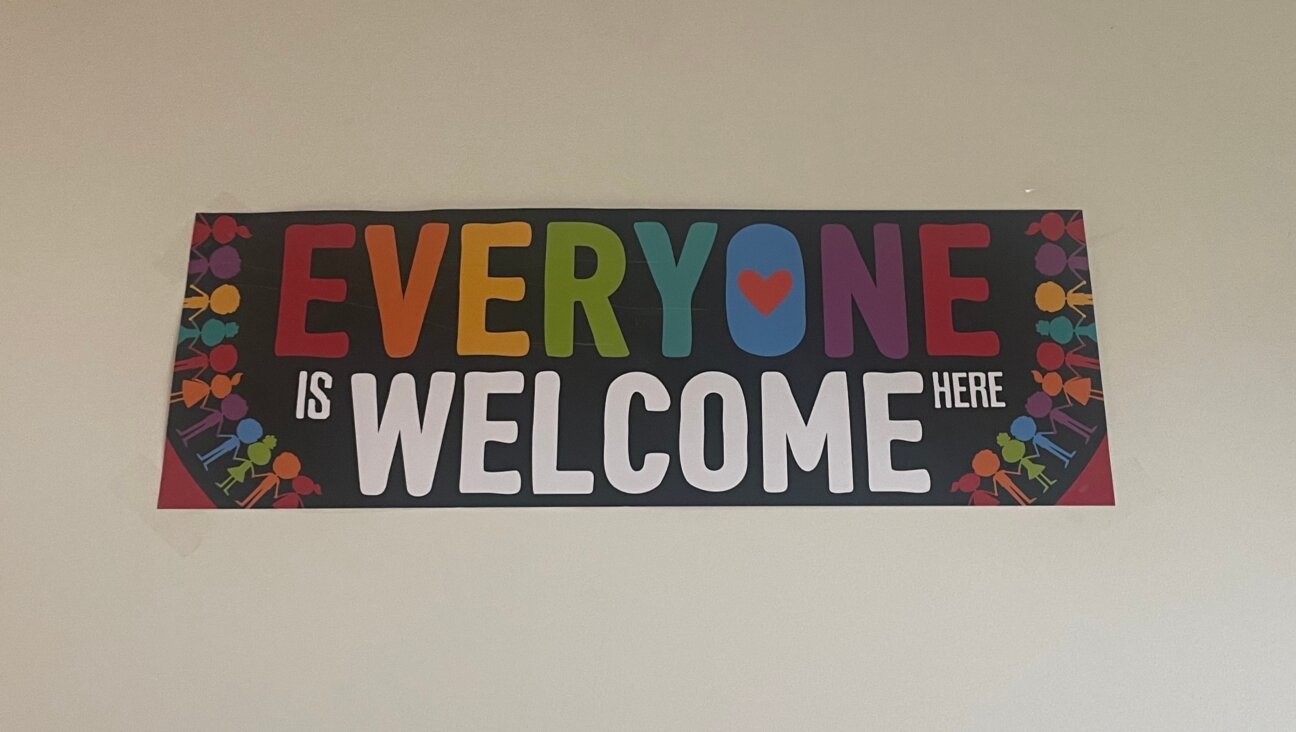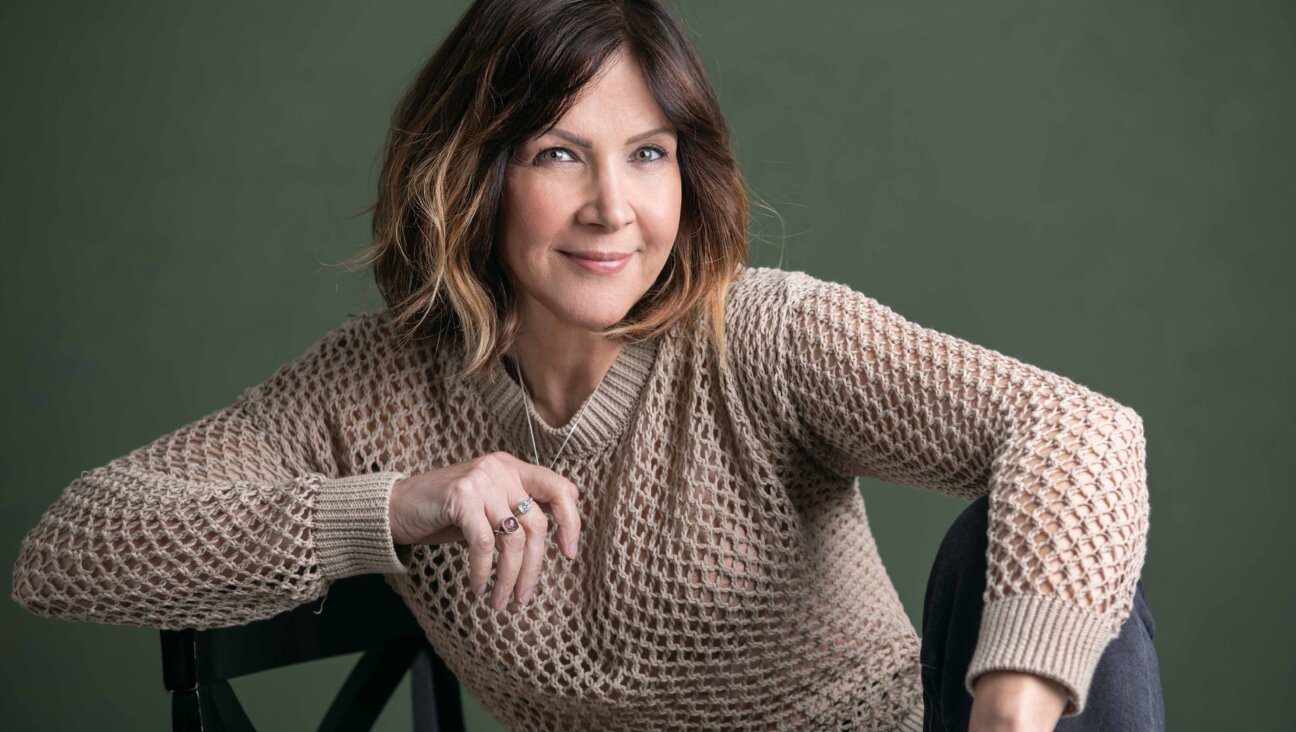An Orthodox rabbi and a Reform journalist dance with the Torah
Rabbi Dov Linzer’s and Abigail Pogrebin’s new book is a lesson on embracing diversity of thought, on both Torah and life
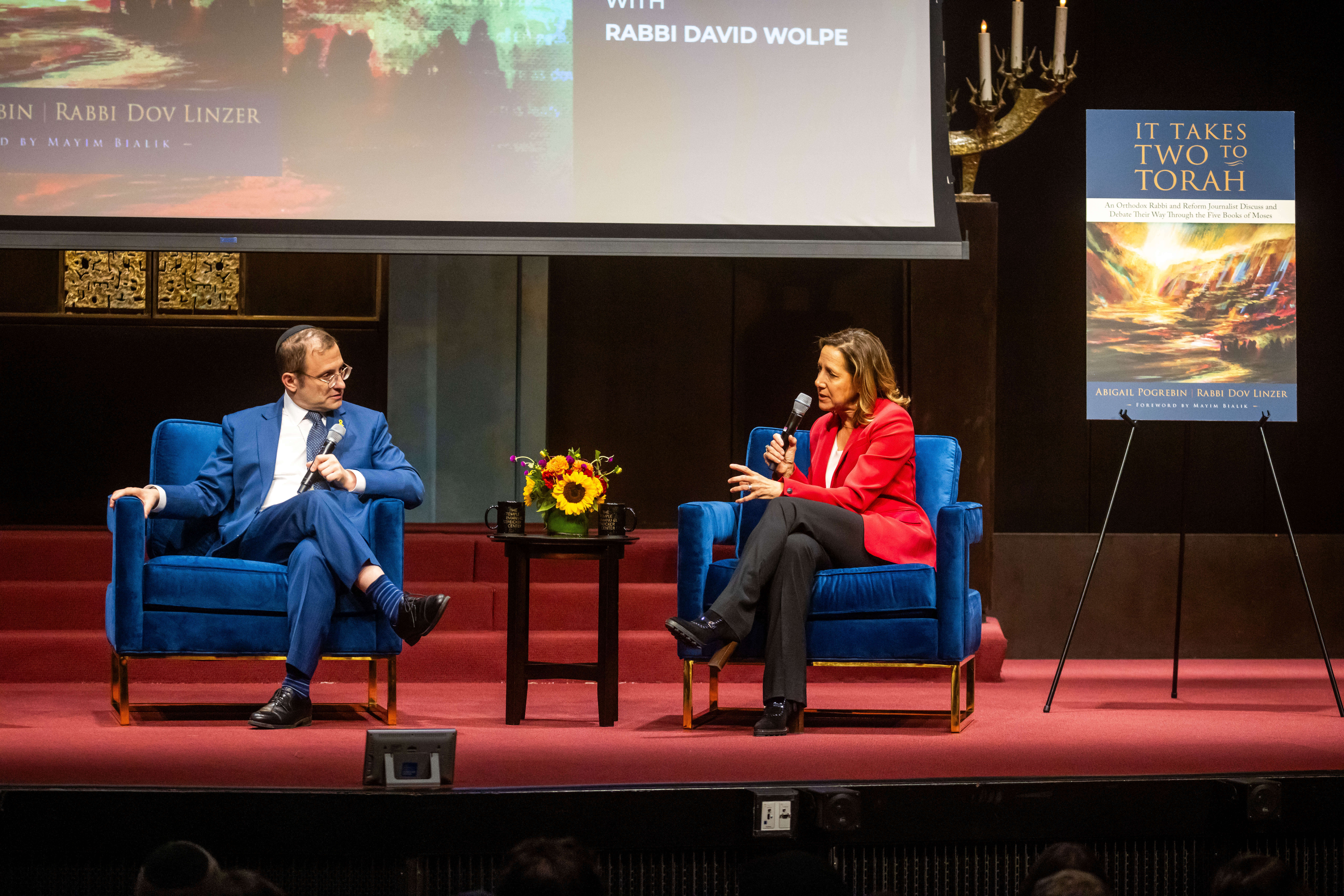
Rabbi Dov Linzer (left) and Abigail Pogrebin (right) speaking about their new book, “It Takes Two To Torah” at a launch event on Sept. 5. Photo by Michael Nagle
A passage in this week’s Torah portion says that when a king ascends the throne, he must write his own version of the scroll, keep it with him, and “read it all the days of his life so he may learn to revere God.”
Rabbi Dov Linzer, who has spent decades studying Torah daily, always saw this as a lesson in humility. Even the king must constantly be reminded that the real ruler — writer of the scroll, maker of the laws — is divine.
Then Linzer parsed the text with Abigail Pogrebin, a journalist and author who grew up secular but became a bat mitzvah at age 40 and later president of Central Synagogue, one of the largest in the country. She focused on the “read it all the days” part and declared the passage to be about “lifelong learning.”
Which is, of course, exactly what both of them were doing, and what they hope we will all do, with their new book, It Takes Two to Torah.
“Many people say, ‘Why are we reading these same exact words every year?’ This parsha is the answer to me,” Pogrebin told me, using the Hebrew word for portion., and referring to Shoftim, Judges, the portion Jews worldwide will read this Shabbat.
“Shoftim really shouted out this idea of needing Torah with you all the time,” she explained. “There’s a sense of having to keep learning it. This isn’t something that is finished. It is ongoing, and you owe something to it.”
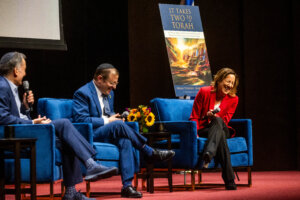
It’s cliché but also true that they’re an unlikely pair. He, nerdy and Orthodox, always in a suit and tie, a bit pale perhaps from spending so many hours in the beit midrash, study hall, dissecting text with other Orthodox men (and a few women). She, Manhattan-cool and Reform, often in a sleeveless top and tailored pants, daughter of the feminist legend Letty Cotton Pogrebin and professional poser of good questions.
They both really love being Jewish. And, like many couples, they make each other laugh.
They are not married — well, not to each other. They are chevruta: study partners.
The root of the Hebrew word is chaver, which means friend, but the idea is really that any two people can come together over text and unpack it. Linzer, 57, and Pogrebin, 59, shared the fruit of their partnership first on a podcast called Parsha in Progress, with 10-minute episodes on each of the Torah’s 54 chapters. They decided to turn those conversations into a book so people could find them all in one place and, perhaps, continue the conversation in chevruta of their own.
“To bring Torah to a much broader range of people, make people realize that Torah has a lot to say for their lives,” was how Linzer summed up the goal of the project.
“There’s a lot of great insight and content, but what’s really unique is what it’s modeling,” he added. “There’s all this white space on the page. That’s what invites people in.”
The duo first met 15 years ago at a conference hosted by the New York Jewish Week called, appropriately, The Conversation. They kept in touch — Pogrebin helped Linzer write an op-ed for The New York Times on religion and modesty; when she was working on a series of articles for the Forward that became her 2017 book My Jewish Year, he often got late-night texts fact-checking some point of Jewish law.
“There was something unexpectedly meaningful about calling each other to talk something through,” Pogrebin, who is a friend and a supporter of the Forward, said when the three of us spoke yesterday.
“When Abby would ask me a question, sometimes I would have to research it a little bit,” added Linzer. “She was asking me a question, but we wound up learning from each other, because her questions were so probing. Normally, the questions that get asked to me are all within these very narrowly defined parameters.”
There is a fundamental difference in how they approach the text. She sees Torah as a book of collected wisdom that has bound the Jewish people over generations, which offers insights into how to live but also contains many problematic passages. He sees it as a divine outline of his religious obligations.
“I’m pre-committed to finding a resolution, to it being God-given and a good text and a binding text,” Linzer explained when asked about this by Rabbi David Wolpe at last night’s launch event for the book, whose publication date is Tuesday.
“He has to find a positive lens on a thing that I find very difficult,” Pogrebin said. “Sometimes, I feel like you’re pretzeling.”
Take, for example, the “Sotah ritual,” a test the Torah outlines for women accused of adultery. They are supposed to drink an inky liquid, and if their stomach distends, they are found guilty and punished. Pogrebin read and re-read the passages describing this and declared it “horrific.” Linzer, who sees the Torah “as a book for all time but also of its time,” argued that Sotah was actually a progressive response to patriarchal societies where women accused of cheating could be summarily executed.
“I thought that I’d really dealt with it and come up with a very gratifying answer,” Linzer said in our interview. “And then to realize, it’s gratifying for you that’s already in Orthodoxy, and committed and needs it all to work. But for anybody from the outside, you still have this text that is just so harsh and against our morés and values.”
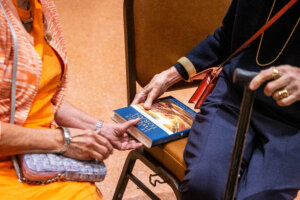
They struggled a bit with guardrails for their own conversations, because Linzer insisted on critiquing the text with reverence. If Pogrebin asked, “Is this text sexist?” he would ask her to reframe that as, “Do I experience the text as sexist?” When she said, “Are these the right Ten Commandments?” He would respond, “Are these the right Ten Commandments for you?”
Now that they’re heading out on book tour, there are other such issues to navigate. Linzer, president of Yeshivat Chovevei Torah, an Orthodox rabbinical school in the Bronx, decided he would speak in non-Orthodox synagogues on Shabbat, so long as he himself is not on a microphone. At last night’s book party, Pogrebin was apologetic that the little tins of mints she ordered with the image of the book cover — they jokingly called them the Ten Commandmints — were not certified kosher.
“We don’t have to believe the same things about the divinity of the text,” Linzer said. “But I don’t want to feel my buttons being pushed.”
“Many people say, ‘Why are we reading these same exact words every year?’ This isn’t something that is finished. It is ongoing, and you owe something to it.”
– Abigail Pogrebin, co-author, It Takes Two to Torah
This felt to me like the heart of the matter, and not just for studying Torah in chevruta with someone from a different religious background. It applies equally to journalism and politics in our polarized world.
The key is to help people to engage with ideas that are unfamiliar without pushing their buttons in a way that makes them shut down.
This summer, my daughter, Shayna, was lucky to be part of the Bronfman Fellowship, a leadership program focused on Jewish pluralism. Bronfman brings together rising high school seniors from different backgrounds — Reform, secular and frum; Jewish day school and not — for five weeks of study and travel. Shayna called home the first weekend to say a few of them had stayed up till 3:45 a.m., “solving pluralism.”
The essence, she explained later, is to remove the barriers to entry for everyone — to try not to push anybody’s buttons — and then for everyone to accept that they will be somewhat uncomfortable once they get inside.
It’s a delicate dance. Which is why it takes at least two to Torah.
A message from our Publisher & CEO Rachel Fishman Feddersen

I hope you appreciated this article. Before you go, I’d like to ask you to please support the Forward’s award-winning, nonprofit journalism so that we can be prepared for whatever news 2025 brings.
At a time when other newsrooms are closing or cutting back, the Forward has removed its paywall and invested additional resources to report on the ground from Israel and around the U.S. on the impact of the war, rising antisemitism and polarized discourse.
Readers like you make it all possible. Support our work by becoming a Forward Member and connect with our journalism and your community.
— Rachel Fishman Feddersen, Publisher and CEO









